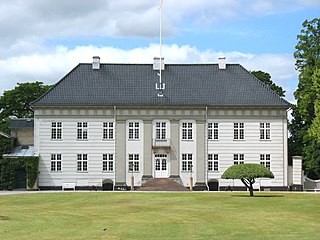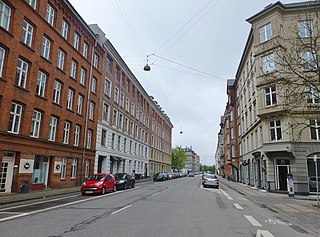
Frederiksværk is a town with a population of 12,718 in Halsnæs Municipality on Zealand in Region Hovedstaden in Denmark.

Corselitze, or Korselitse, is a manor house on the island of Falster in the south-east of Denmark. The Neoclassical house was built in 1777 by Johan Frederik Classen, who at the time of his death founded Det Classenske Fideicommis, which owns the estate today.

Arresødal is a manor estate situated in Frederiksværk, in Halsnæs Municipality on the island of Zealand in Region Hovedstaden, northeastern Denmark. Surrounded by forest to the west of lake Arresø, it now functions as a private hospice.

Andreas Johannes Kirkerup was a Danish architect and master builder, one of the most significant pupils of Caspar Frederik Harsdorff. Together with architects such as Andreas Hallander and Johan Martin Quist, he played a major role in the rebuilding of Copenhagen after the Great Fire of 1795.

Hesnæs is a little fishing village located 12 kilometres (7.5 mi) southeast of Stubbekøbing on the Danish island of Falster. It is best known for its thatched, straw-clad houses, not found elsewhere in Denmark.

Corselitze Forest is located on the Danish island of Falster. Situated in the northeast of the island, it contains white pine plantations, although beech is the most common tree species.

Johan Frederik Classen, frequently also J. F. Classen, was a Danish-Norwegian industrialist, major general, landowner and founder of Det Classenske Fideicommis. He served as chancellery adviser to King Frederik V. Classen built the manor house Arresødal in 1773, he renovated the Neoclassical manor house Corselitze in 1777, and built the General's Summerhouse by the Corselitze Forest.

The Classen Library was a public library in Copenhagen, Denmark, created from the private book collection of Johan Frederik Classen at the time of his death in 1792. It was the third largest library in the city, surpassed only by the Royal Danish Library and Copenhagen University Library and existed until 1867 when it was merged with the latter.

Peter Hersleb Classen, frequently also P. H. Classen, was a Norwegian-Danish statesman and director of Det Classenske Fideicommis.

Generalens Lysthus is a small, thatched cottage in Tromnæs Forest on the Danish island of Falster. It was built in 1786 by the industrialist Johan Frederik Classen who also built nearby Corselitze.

Godthaab Church is a Church of Denmark parish church situated on Nyelandsvej in the northern part of the Frederiksberg district of Copenhagen, Denmark. Godthaab Parish takes its name from Godthaabsvej, the principal artery of the area.

Alf Cock-Clausen was a Danish architect. He was active during the transition from Neoclassicism to Functionalism and many of his works show influence from Art Deco. His factory for the distillery De Danske Spritfabrikker at Aalborg's harbour front was declared a Danish Industrial Heritage Site in 2009.

Henrik Jørgen Huitfeldt-Kaas was a Norwegian historian and Director-General of the National Archives of Norway (riksarkivar).

Frederik Vilhelm Tvede was a Danish architect.

The Classen Mansion is a Neoclassical manor house situated on Strandgade in Helsingør, Denmark. It was built for a prosperous businessman in the 1790s and now houses the local Odd Fellows Lodge. The house overlooks Helsingør's harbourfront at Wibroes Plads and is flanked by Skibsklarerergaarden to the left and the Stephan Hansen Mansion to the right.

The Jan von Osten House is a listed Baroque style property at the corner of Amaliegade with Toldbodgade in the Frederiksstaden neighbourhood of central Copenhagen, Denmark. The building was the city home of Classen from 1770 until 1792 and is still owned by and serves as headquarters of Det Classenske Fideicommis until 1970.

The English Terrace at Toldbodgade 71– 87 is a row of consecutive terraced houses in the Frederiksstaden neighbourhood of central Copenhagen, Denmark. The terrace was built in 1873–74 to design by Vilhelm Tvede for Det Classenske Fideicommis. It is listed.

Classensgade is a street in the Østerbro district of Copenhagen, Denmark. It runs from Østerbrogade in the southwest to Østbanegade in the northeast.

Grønnessegaard is a manor house and estate located just east of Hundested in Halsnæs Municipality, Denmark, some 50 kilometres (31 mi) northwest of Copenhagen. The estate was established by Johan Frederik Classen in 1776. The two-storey main building is from 1859.
Jens Juel was a Danish estate owner, chamberlain and Member of the Royal Hunt. He was from 1938 the owner of Petersgaard at Vordingborg, including the vast Pedersgaard Forest District. He was a board member of the Danish Forrest Association (1959–1965). He served as director both of Den Suhrske Stiftelse (1940–1962) and of Det Classenske Fideicommis (1948–1974).




















